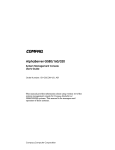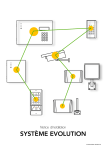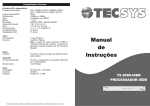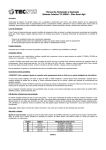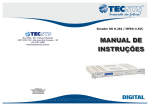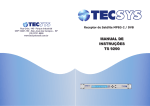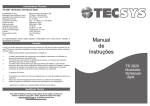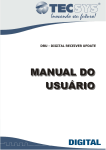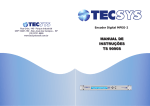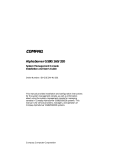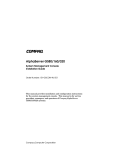Download York Version 1.5.0 User's Manual
Transcript
W INDOWS NT/2000 I NSTALLATION G UIDE R EVIS ION /U PDA TE I NF ORMA TION : 01/02/2002 O PERA TIN G S YSTEM V ERSION : W I N D OW S N T 4 . 0 O R L A T E R W I N D OW S 2 0 0 0 S OFTWARE V ERSION : V E R SI ON 1 . 5 - 0 T E C S YS D E V EL OPM E NT, I NC. 1 6 0 0 1 0 TH S TREET, S UITE B P L AN O , T E X AS 7 5 0 7 4 Copyright (c)2002 TECSys Development Inc. Printed in the United States of America. TECSys Development Inc. (TDi) makes no representations or warranties with respect to the contents hereof and specifically disclaims any implied warranties of merchantability or fitness for any particular purpose. Furthermore, TDi reserves the right to revise this publication and to make changes from time to time in the content hereof without obligation of TDi to notify any person of such revision or changes. No part of this publication may be reproduced, transmitted, transcribed, stored in a retrieval system, or translated into any language or computer language, in any form or by any means electronic, mechanical, magnetic, optical, chemical, or otherwise without the prior written permission of: TECSys Development, Inc. 1600 10th Street Suite B Plano, TX 75074 USA Phone: 972-881-1553 FAX: 972-424-9181 Email: [email protected] web: http://www.tditx.com/ Use, duplication, or disclosure by the Government is subject to restrictions as set forth in subparagraph (c)(1)(ii) of the Rights in Technical Data and Computer Software clause at DFARS 52.227-7013. All product or company names mentioned in this document are trademarks or registered trademarks of their respective owners. All Rights Reserved. ConsoleWorks NT Telnet JAVA Applet makes use of the public domain Telnet Applet. TECSys Development did not write the Telnet Applet nor does it claim any particular license to the applet excepting those rights given by the GNU Library General Public License. The Telnet Applet credits are listed below: The Telnet Applet Copyright (c) 1996-98 Matthias L. Jugel, Marcus Meibner http://www.first.gmd.de/persons/leo/java/Telnet/ All Rights Reserved. Unicenter Console Management for OpenVMS (formerly known as PolyCenter Console Manager) is a registered trademark of Computer Associates Inc. Alpha, AXP, OpenVMS, and VAX are registered trademarks of Compaq Computer Corporation. NT is a registered trademark of Microsoft Corporation. Netscape, Internet Explorer, Macintosh, Tru64 Unix, Linux, Solaris, SPARC HP-UX, and PA-RISC are registered trademarks of their respective organizations. i Table of Contents 1.This Guide ...............................................................................................................................................1 1-1.Purpose ................................................................................................................................................1 1-2.Intended Audience ..........................................................................................................................1 1-3. Organization and Chapter Layouts of this Guide ......................................................................1 1-4.. Introduction, Overview and Concepts .......................................................................................1 1-5. Pre-Installation ...................................................................................................................................1 1-6. Installation ..........................................................................................................................................1 1-7. Appendices .......................................................................................................................................1 1-8. Reader Feedback ............................................................................................................................1 1-9. Customer Support ............................................................................................................................2 1-10. Conventions used in the Guide ...................................................................................................2 2. Introduction and Overview ...............................................................................................................3 2-1. Introduction to ConsoleWorks........................................................................................................3 2-2. Overview of the ConsoleWorks Installation Process ..................................................................3 2-3. Installation Terms...............................................................................................................................4 2-4. Installation Concepts .......................................................................................................................6 3. Pre-Installation ......................................................................................................................................9 3-1. Host System Criticality and ConsoleWorks Exclusivity ................................................................9 3-2. Host Operating Systems Supported ..............................................................................................9 3-3. ConsoleWorks is available on CD ROM or from the Internet ...................................................9 3-4. Product Authorization Key (PAK) is Required ..............................................................................9 3-5. Files at the TDi Website ....................................................................................................................9 3-6. Release Notes ...................................................................................................................................9 3-7. Host System Requirements ............................................................................................................. 10 3-8. Administrator Account Privileges are Required ........................................................................ 10 3-9. Ongoing Disk Space Requirements ............................................................................................. 10 3-10. Web Browser Requirements ........................................................................................................ 10 4. Installation ............................................................................................................................................ 11 4-1. Make Backup of System Disk(s) .................................................................................................... 11 4-2. Installation Process .......................................................................................................................... 11 4-3. State of Installation after Completion ......................................................................................... 16 4-4. Installing ConsoleWorks License(s) ............................................................................................... 16 4-5. Starting the ConsoleWorks Server................................................................................................. 17 4-6. ConsoleWorks and the Services Control Panel ......................................................................... 17 4-7. Add ConsoleWorks to the System Startup .................................................................................. 17 4-8. ConsoleWorks Manual Starts and Manual Shutdowns ............................................................ 17 4-9. Adding Functionality....................................................................................................................... 18 4-10. Importing POLYCENTER Console Manager (PCM) Port Files ................................................. 18 4-11. ConsoleWorks Databases ............................................................................................................ 18 4-12. Editing ConsoleWorks Default Templates ................................................................................. 18 5. Software Update................................................................................................................................. 21 5-1. Stop the ConsoleWorks Server and License Manager ............................................................. 21 5-2. Remove the ConsoleWorks Client and Server Programs......................................................... 21 5-3. Re-install the ConsoleWorks Server and Client Programs ........................................................ 21 5-4. Install ConsoleWorks License(s) ..................................................................................................... 21 5-5. Start the ConsoleWorks Server ...................................................................................................... 21 5-6. Add ConsoleWorks to the system startup ................................................................................... 22 ii Appendix 1—Profile Rules and Examples ........................................................................................... 23 Appendix 2—HTML Directory Edits ...................................................................................................... 25 Appendix 2—Directory Listing ............................................................................................................... 27 Appendix 3—ConsolleWorks Version 1.4-0 to 1.5-0 Directory Cross-Reference .......................... 35 iii 1. This Guide 1-1. Purpose This guide describes how to install and configure ConsoleWorks on a host using Windows NT version 4.0 with Service Pack 3 or later or Windows 2000 operating system. 1-2. Intended Audience This guide is written for system administrators and managers installing and configuring the ConsoleWorks application on a Windows NT or Windows 2000 host. 1-3. Organization and Chapter Layouts of This Guide This section describes the purpose of the guide, intended audience, organization and features of this guide, reader feedback, customer support, and conventions used in this guide. 1-4. Introduction, Overview and Concepts This section introduces the ConsoleWorks application. It also describes an overview of the installation process, terms and concepts used during the installation, some of the concepts used in configuration and has a special note for Polycenter Console Manager (PCM) users. 1-5. Pre-Installation This section helps the installer prepare to install ConsoleWorks by listing the hardware and software needed to install and run ConsoleWorks and by suggesting some installation design hints and techniques. 1-6. Installation This section contains the first stage of the installation procedure for installing ConsoleWorks onto a host machine. Once the default installation file set is installed, optional functions, such as: • importing supplied event definitions, and/or • adding ConsoleWorks to the system startup, are added based on the desired ConsoleWorks functionality. The second stage of the installation procedure for installing ConsoleWorks onto a host machine is called Configuration and is covered in the document: ConsoleWorks Administrator and User Guide. 1-7. Appendices The appendices include a additional information that may be useful during installation. 1-8. Reader Feedback TDi welcomes comments to this guide and other products. Readers are encouraged to send feedback to TDi at: TECSys Development Inc (TDi) Phone: 972.881.1553 1600 10th Street FAX: 972.424.9181 Suite B Email: [email protected] Plano, TX 75074 USA WEB: http://www.tditx.com/ attn: ConsoleWorks Customer Feedback 1 1-9. Customer Support TDi customer support is offered through several venues: internet website, email, phone and fax. When requesting customer support, an active Service Agreement and the following information will be needed from the customer: • • • • • • • Name and Contact Information Company Name Customer ID Model of host running ConsoleWorks Host operating system version and patch level ConsoleWorks version Description of problem Customer support offices are staffed Monday through Friday, 8:00am to 5:00pm Central Time. TDi customer support can be reached as follows: internet website: http://www.tditx.com/ email: [email protected] phone: 972.881.1553 fax: 972.424.9181 If requesting fax support, please be sure to include a return fax number in the Contact Information. 1-10. Conventions used in this Guide Enter Indicates a key on a PC or terminal keyboard, this example indicates pressing the Enter key. Ctrl-X A hyphen between keyboard keys indicates a combination of keys on a PC or terminal keyboard to be pressed simultaneously, this example indicates pressing the Ctrl key and the X key simultaneously. cw_add_invo Italics indicates a filename, command, variable name or other screen text. cw_add_invo Boldface type in examples indicates input the user types. [] Indicates optional information to be included with the command at the installers discretion. [Y] or [N] Items contained within square brackets [] are default settings in the ConsoleWorks application. For example, when queried with a Yes or No answer the default setting will show a [Y] or [N]. Continuation. Usually used when the script responses being shown in the text or body of the guide continue beyond what is shown on the page. 2 2. Introduction and Overview 2-1. Introduction to ConsoleWorks ConsoleWorks is an application built to monitor console port text or SYSLOG messages and to directly manage any device supporting console port connections. It runs on OpenVMS, Unix and NT/2000 platforms. In addition, ConsoleWorks can manage devices indirectly by using script-initiated management applications running on the ConsoleWorks host. ConsoleWorks accomplishes this management with three major components: • a standard web browser (or a command line user interface) • a specialized web server, and • a host connected via cable to the device’s serial console port (direct management) or by network (indirect management). Other than the original installation and some preliminary configurations, most ConsoleWorks operations are managed and configured using a standard web browser. ConsoleWorks' flexibility provides the capability: • to manage any device allowing management from a console port from any workstation on the network connected to the ConsoleWorks host, • to manage hosts on a network remotely, either via the internet or a dialup network, • for a ConsoleWorks server to use host-based utilities to contact a person based on event driven criteria, and • to organize managed devices into logical groupings. ♦ note: The V1.5-0 ConsoleWorks server for the Windows NT/2000 platform supports one server invocation. Future releases will provide the capability for multiple invocations on one server. Each ConsoleWorks invocation is a separate entity. Two concurrently running invocations do not share resources (profiles, users or console ports). ConsoleWorks Windows NT/2000 server requires a system running Windows NT 4.0 with at least Service Pack 3 or Windows 2000. ConsoleWorks also requires a TCP/IP protocol stack. The V1.5-0 ConsoleWorks Product Kit contains the files required for installing the following ConsoleWorks components: 1. ConsoleWorks Web Server, and 2. ConsoleWorks public domain scan and event definitions. This guide describes how to install ConsoleWorks on a Windows NT/2000 host. ♦ note: ConsoleWorks requires a valid license to operate. 2-2. Overview of the ConsoleWorks Installation Process It is strongly recommended that installers design and plan their implementation of a ConsoleWorks installation. ConsoleWorks components require configuration that proceeds much more smoothly when an installation plan is followed. Suggestions and recommendations can be found in the Installation Concepts section of this chapter. ConsoleWorks installs in two stages. 1) The first stage of the installation includes: • downloading ConsoleWorks from the internet or mounting the CD, • installing ConsoleWorks from the distribution kit, 3 and optionally, • adding ConsoleWorks to the system startup, • editing templates to customize event and user templates, and • importing existing Users, Consoles, Scans, Events and/or Databases. ♦ note: Technically, ConsoleWorks has created an invocation after this stage of installation is completed. However, the invocation has no configured Ports, Profiles, Users, or Events. These components must be configured to make ConsoleWorks useful. 2) The second stage of installation uses a web browser to add/delete/configure items such as: • accounts, • consoles, • profiles, • scans, • events, and • actions. 2-3. Installation Terms The following terms are provided as reference. It is recommended these terms be studied in conjunction with the next section in this document: Installation Concepts. Agent If the device being managed has Windows NT/2000 as its operating system, that Windows NT or Windows 2000 system requires an agent to gather and transmit its events since Windows does not have a serial console. Alpha A host running an Alpha processor as its primary CPU. CD Refers to a Compact Disc. Console Console refers to a representation created and configured within ConsoleWorks, corresponding to a managed device. The console may be physically attached to a device console port or it may be mapped to Syslog events. Privileges are read, write, acknowledge and control. ConsoleWorks Root Directory The base directory on the ConsoleWorks server system in which all ConsoleWorks directories reside. On Windows NT/2000, this directory is C:\Program Files\TECSys Development, Inc\ConsoleWorks Server\. Device Console Port A Device Console Port is a serial port on a device that is used to manage that device. Default Files Default Files are a basic set of files created by ConsoleWorks installation kits when ConsoleWorks is first installed. Those files are subsequently used to make invocation directory trees. Each invocation has its own directory tree based from the ConsoleWorks root directory. Display Display refers to a particular Window or Splash Screen displayed during a step in the installation. Screen, Window and Display are used interchangeably in this guide. 4 Distribution Kit or Package A Distribution Kit or Package is a file or files that enable a person to install the ConsoleWorks application. Each operating system (Windows NT/200 OpenVMS, Tru64, Linux, HP UX and Solaris) uses a unique distribution kit. Events Events are conditions occurring on devices which cause the devices to post status messages to their console ports or onto the network with Syslog. ConsoleWorks scans console text and Syslog messages for information and to use as triggers to initiate actions. Installer An Installer is the person installing the ConsoleWorks application and configuring the invocations and profiles. The installer is required to have Administrator access privileges. Intel A host running an Intel processor as its primary CPU. Invocation An Invocation is a copy of the ConsoleWorks application running on the host. Each invocation is an application/web server hybrid that allows remote management of devices. Each invocation uses a private set of consoles, profiles, and user accounts. ♦ note: Each invocation is required to have a unique name since two invocations using the same invocation name cannot operate concurrently on the same host system. Linux A host running Redhat Linux 6.0 (or later) as its operating system. PCM POLYCENTER Console Manager in this document refers to Computer Associates’ Unicenter Console Management for OpenVMS which includes technologies formerly available as: CommandIT Enterprise Edition, Unicenter TNG for OpenVMS Console Manager, POLYCENTER Console Manager Product Authorization Key (PAK) ConsoleWorks licenses are composed of ConsoleWorks Product Authorization Keys (PAK). The Base PAK includes five connections. Extra connections can also be added. Additional features such as Telnet and Syslog capabilities can be added with additional PAKs. Profile Profile refers to a set of privileges to consoles and/or ConsoleWorks server administration. Some aspects of a profile are: • a profile may contain some or all of the privileges available on a console port, • multiple users may have the same profile, • multiple profiles can provide privileges to the same console port(s), and • a user may have access to one or more profiles, but may use only one profile at a time. In addition, profiles are used to access ConsoleWorks invocation management as well. ConsoleWorks management has the ability to read, write, control and delete console ports, profiles and user accounts. Scans A scan is a collection of events, other scans or a combination of the two. As a result, a scan could contain only events, only other scans or both scans and events. Screen Screen refers to a particular Window or Splash Screen displayed during a step in the installation. Screen, Window and Display are used interchangeably in this guide. 5 Solaris A host running SUN Solaris 7.0 (or later) as its operating system. SPARC A host running a SUN SPARC processor as its primary CPU. TCP/IP or Transmission Control Protocol/ Internet Protocol port The Transmission Control Protocol/ Internet Protocol port(s) each host controls. Each invocation is assigned a specific TCP/IP port to use. User Account User account refers to the access a person receives when logging into ConsoleWorks. A user's access to a console port and to ConsoleWorks management is defined by what profiles the user is given permission to use. ♦ note: Users may have access to more than one profiles, but may only use one profile at a time. VMS A host running Compaq OpenVMS V7.2 (or later) as its operating system Web Browser Commonly used Web Browsers such as Netscape Navigator 4.7 or Internet Explorer 5.0 (or later) web browsers are required to complete the configuration of the installed elements. Window Window refers to a particular Window or Splash Screen displayed during a step in the installation. Screen, Window and Display are used interchangeably in this guide. 2-4. Installation Concepts The following describe the relationships between some of the functional components used by ConsoleWorks. Understanding the following concepts will: • assist in designing an installation, • prepare the installer for the installation and configuration processes, and • reduce the need for large scale configuration changes and installation redesigns after installation. Installation Phases Pre-Installation The period prior to Installation where the installer collects required software and verifies the host system meets the requirements for ConsoleWorks installation and operation. Installation ConsoleWorks on drive Invocation setup files on drive invoked copy of ConsoleWorks in host's memory This phase includes the steps involving installing the ConsoleWorks application on the target host, setting up a basic invocation, adding ConsoleWorks to the system startup and selectively adding prepackaged event definitions. ConsoleWorks invocations are highly configurable. During the installation phase the installer is presented opportunities to edit files that will be used globally by each invocation, such as event template files. Most of these changes can also be made later. Figure 1 - Invocation 6 Configuration Configuration is the period after Installation involving creating and configuring consoles, profiles, and user accounts. Invocations are in a default mode after installation and are not fully functional until configured. Configuration operations are performed using a web browser and are described in the ConsoleWorks Administration and User Guide. Invocation Components (Figure 2) Invocation A copy of the ConsoleWorks application running on the host. Users, profiles, and consoles are exclusive to each invocation. profiles users A user 01 console port 02 RW ConsoleWorks management console port 03 R B B C A user 02 C A user 03 rule1: rule 2: rule 3: rule 4: Concept of a ConsoleWorks invocation console port 01 RWAC A C read write console port 01 RWAC console port 03 RW delete control 04 03 02 console port 04 R console port 01 RW console port 01 console port 02 RWAC ConsoleWorks management RWDC only one set of privileges per console port to a profile only one active profile at a time for each user more than one user may have access to and use a profile privileges to a console port may vary between profiles read write acknowledge control device console port(s) (physical) or Syslog Event profile access privileges to a console port or to ConsoleWorks management Figure 2 - Invocation Components Device Console Port The physical connection between the host and the external device. Console The representation within ConsoleWorks of the a device console including all the parameters necessary to communicate with that console. A console has four privileges: Read, Write, Acknowledge and Control (RWAC). Access to a console is controlled via profiles. Each user is given access to a specific profile or profiles. Profile A configured set of privileges providing access to consoles and/or to ConsoleWorks administration within an invocation. Users are given profile access by user(s) with access to ConsoleWorks management profile (s). Console privileges are Read, Write, Acknowledge and Control (RAWC). ConsoleWorks administration privileges are Read, Write, Delete and Control (RWDC). Some rules for configuring and using profiles per invocation are: rule 1: each profile has only one set of privileges per console, rule 2: each profile may have access to one or more console, rule 3: each user may have only one active profile at a time, rule 4: more than one user may have access to and use a profile, and rule 5: privileges to a console may vary between profiles. A tabular example of these rules is shown below in Table 1. In Table 1, the profiles User 1, User 2, Manager 1 and Manager 2 were created solely for the purpose of the example and are not standard profiles in ConsoleWorks. User A person logging into a ConsoleWorks invocation's user account. Generally speaking, the difference between an administrative account and a user account is the access to ConsoleWorks management profiles. All users are permitted to have access to more than one profile, but can only use one profile at a time per invocation. ConsoleWorks Manager A person logging into a ConsoleWorks invocation with the ConsoleWorks Administrative privileges which are the ability to Read, Write, profiles device a device b device c consoleworks app Delete and Control (RWDC) user 1 R R user accounts, profiles and user 2 RW R R console ports. ConsoleWorks manager 1 RW RWAC RW RWDC Managers are permitted to acmanager 2 RWAC RWDC cess more than one profile, but Table 1. Profiles to device mapping example can only use one profile at a time per invocation. 7 Installation Tips and Recommendations ConsoleWorks supports customizing an invocation's templates. Each invocation has its own directory and subdirectories. The original templates created during installation are located in the Config subdirectory under the installation directory specified during the installation process. For Windows NT/2000, the default is C:\Program Files\TECSys Development, Inc\ConsoleWorks Server\Config. An installer intending to use the same modifications to the templates across several invocations could save significant effort by editing the templates made during the original installation, make the modifications to the ConsoleWorks root directory templates. This may be especially useful when the HTML templates are modified with company specific data, company policy comments or HTML jumps to company specific files (such as networked documentation). Each invocation opens all of its device consoles when it is invoked, therefore the installer should make sure invocations expected to run concurrently do not attempt to access the same devices. Special Note for Polycenter Console Manager (PCM) owners ConsoleWorks comes with an array of predefined scans/events, many exported from PCM. These events can be imported during the installation process or later. The procedures for importing the events for are in the chapter on Installation in the Adding Functionality section. 8 3. Pre-Installation This section contains information on the fundamentals required for installation. Note: 1) When installing the ConsoleWorks Server on Windows an error will be displayed if you try to install V1.5 when a previous version is installed. You must uninstall the previous version before attempting to install V1.5. 2) the ConsoleWorks directory structure for Version 1.5-0 is significantly different from Version 1.4-0. The base directory for Version 1.4-0 was C:\Cwks where there base directory for Version 1.5-0 is C:\Program Files \TECSys Development, Inc\ConsoleWorks Server. 3-1. Host System Criticality and ConsoleWorks Exclusivity ConsoleWorks' primary function is to monitor the health and status of chosen devices, at all times. As a monitoring application, ConsoleWorks requires unobstructed access to host system resources at all times. It is the strongest recommendation that ConsoleWorks be hosted on a dedicated, independent machine. Interference from other applications, for example email or printer server support, may interrupt support at critical times, delaying and possibly precluding recovery efforts. 3-2. Host Operating Systems Supported ConsoleWorks is written for hosting on OpenVMS, Unix and Windows platforms. This guide is the manual for the Windows platform hosts running the following (or later) versions: Windows NT 4.0 with Service Pack 3 or Windows 2000 (right click on the My Computer icon and choose Properties to verify current version of the operating system). ♦ note: ConsoleWorks can run under its own account or under the Administrator account. 3-3. ConsoleWorks is available on CD ROM or from the Internet ConsoleWorks is available on CD ROM or the latest version can be downloaded from the TDi website at http:// www.tditx.com/. Contact TDi to obtain ConsoleWorks in another format. 3-4. Product Authorization Key (PAK) is required A Product Authorization Key (PAK) is not required for installation, but is required to activate a ConsoleWorks invocation. TDi will supply the appropriate permanent license with receipt of a purchase order. A temporary demo license may be downloaded from the same place the ConsoleWorks kit was downloaded. 3-5. Files at the TDi Website Table 2 has a list files that will be referenced during installation. These ConsoleWorks installation files are available at the TDi Website (http://www.tditx.com/). host system ConsoleWorks version and kit type Filename on website* Windows NT Intel (4.0+) or Windows 2000 ConsoleWorks (v1.5-0) kit ConsoleWorksServer. exe 3-6. Release Notes Table 2. List of available ConsoleWorks installation files at the TDi Website (http://www.tditx.com) ConsoleWorks release notes contain information updated since the written manuals were published. These release notes are stored as installation CD, and once ConsoleWorks is installed, via the web browser. The locations of the RELNOTES1_5.*** files are shown in Table 3. 3-7. Host System Requirements Hard Disk require- On CD before installation ConsoleWorks version and kit type Filename on website* Location on CD ROM from root directory: Location on host after installing kit: From the ConsoleWorks home page: C:\Program Files\TECSys Development, Inc\ConsoleWorks Server\Doc C:\Program Files\TECSys Development, Inc\ConsoleWorks Server\Doc HELP(left panel): Online Doc (left panel lower): Click either Text or HTML (description: ConsoleWorks V1.5-0 release notes) Table 3. Location of the RELNOTES-1_5*** files 9 ments Systems targeted for running a ConsoleWorks invocation are required to support the minimum disk space requirements shown in Table 4. RAM requirements A minimum of 128MBytes of operating system RAM is recommended. RAM requirements are installation type dependent. Requirements are affected by quantity and activity level of devices monitored by ConsoleWorks in addition to the amount required by the scan files which will be loaded. Package ConsoleWorks Base 10 MBytes ConsoleWorks Command Line Interface Included ConsoleWorks Documentation Included ConsoleWorks Log Files Recommended Minimum CPU requirements ConsoleWorks minimum recommended CPU is the Intel 450 MHz Pentium class processor. Minimum Drive Space Site Dependent 10 MBytes Table 4. Hard Disk Requirements System Software requirements ConsoleWorks is written to be hosted on a machine running Windows NT with Service Pack 3 or later installed or Windows 2000. TCP/IP running on host Hosting platforms must be running TCP/IP. ConsoleWorks requires a TCP/IP address that it will use for listening. The default for ConsoleWorks is to listen to all the interfaces on the ConsoleWorks host (0.0.0.0). The TCP address for ConsoleWorks to listen to is configurable after installation is complete. TCP/IP port requirement The ConsoleWorks invocation requires a TCP/IP port on the host machine. By default, ConsoleWorks installations use port 5176. The port number is configurable after installation is complete. 3-8. Administrator Account Privileges are Required The installation procedure creates the ConsoleWorks directory tree. This requires the installer to be logged into the Administrator account (or another fully privileged account) when performing the installation. ConsoleWorks installation will fail if not installed from an Administrator account, however, once installed ConsoleWorks can be run under a non-privileged account. 3-9. Ongoing Disk Space Requirements Ongoing disk space requirements are installation dependent. Requirements are affected by quantity of and activity level of devices monitored by ConsoleWorks. Each device may produce require different amounts of data which precludes recommending a single quantity of disk space for all installations. It is recommended that the daily log file sizes be reviewed periodically in order to predict future disk space usage. Each addition of a device to the ConsoleWorks invocation warrants re-evaluating the disk space usage. Further, it is recommended that ConsoleWorks log files, which are text files, be archived or deleted based on the user’s criteria. Installers can contact TDi for details and allocation recommendations. 3-10. Web Browser Requirements Netscape Navigator 4.7 or Internet Explorer 4.0 for Intel systems or Internet Explorer 4.5 for Macintosh systems (or later) web browsers are required to complete the configuration of the installed elements. 10 4. Installation This section contains information on the first stage of the installation procedure. The second stage of the installation procedure uses a web browser and is discussed in the ConsoleWorks Administrator and User Guide. Note: If ConsoleWorks is being installed as an update to Version 1.4-0, a new directory structure will be created. Save existing template files, action routines, etc. prior to the installation and move them to the proper directory upon completion of the install. 4-1. Make backup of system disk(s) As a precaution, make a backup copy of the system disk(s). This is a standard precaution. ConsoleWorks installs all of its files into a single directory tree, which should preclude any conflicts, however caution is recommended. 4-2. Installation Process ConsoleWorks installation can be accomplished directly from a CD or from a TDI web site. - note: The installer may not be notified about files about to be overwritten. - note: Installation requires Administrator privileges. If the activity to this point has been done from a common user account, the installer will have to logout and log back in as a user with Administrator access privileges. Administrator privileges Log in to an account with Administrator privileges. Once ConsoleWorks is installed it can be run from a common user account, but the installation is required to be performed from an account with full access privileges. Uninstall all versions of Field Test Software (if applicable) Please uninstall all versions of ConsoleWorks Server V1.5 Field Test. This install will not work if the ConsoleWorks Server V1.5 Field Test is installed. Failure to uninstall the field test version could cause loss of data during install or uninstall of ConsoleWorks Server. Mount the CD The ConsoleWorks CD contains the same files as the TDI installation web site. Open the CD directory and click on the index.html file. Installation from the CD now proceeds exactly as it would from the web site. If using the CD for installation, skip to Installation below otherwise continue with the next paragraph. Open the TDI Installation Web Site The latest copy of the ConsoleWorks software can be found on the TDI Installation Web site (http://www.tditx. com/). Move the software Installation Kit to the Local Disk Find the section of the web page containing the Windows NT/2000 installation kits. The name of the installation executable for the Windows platform is ConsoleWorksServer.exe. The file contains all of the necessary files and information required to install a ConsoleWorks invocation on a Windows platform. Click on the link for this installation kit and save the file to the local disk. - note: A ConsoleWorks license, known as a PAK, must be installed in order to run a ConsoleWorks invocation. Begin the Installation The installation kit can be started using any of the three common Windows methods for starting executables: using Run from the Start menu, running ConsoleWorksServer.exe from the MS-DOS prompt or by double clicking the executable in Windows Explorer. The installation splash screens are shown in the section below. 11 When the user launches ConsoleWorksserver.exe, the InstallShield Wizard progress box will appear. After the initial systems checks are completed the following Welcome panel will appear. The local system is now checked for previous versions that might be incompatible with this version. If such a version is currently installed, the following panel will be displayed. Should this panel be displayed, the user should press the Cancel button and proceed to de-install the previous version before continuing. Note: If the V1.5 install finds the previous version (v1.3 or V1.4) data it will allow you to copy the data to the new version. The previous version data will be copied automatically if you choose the "Typical" setup type. The "Custom" setup type will default to copy the data but it can be changed to not copy the data by selecting the "Copy Previous Version Data" feature and choosing "This feature will not be available". License files, console log files, and all files in the config directory will be copied to the new version when the feature is installed. The ability to copy the previous version data is only allowed during the initial install. You can not rerun the install and choose modify or repair to copy the previous version data. You must uninstall before you can install again to be asked for the copy the previous version data feature. 12 When all checks are completed successfully, the following panel will be displayed. Depress the Next> button to continue. The installation process will now display the License Agreement. Select the I accept the terms in the license agreement item and press Next>. The Customer Information panel will be displayed. Fill in the blanks and press Next>. 13 The installation type panel will be displayed. Under normal circumstances, select the Complete installation and press Next>. If ConsoleWorks is to be installed in a non-standard directory, select Custom and follow the direction panels. 14 When the Ready to Install the Program panel is presented select Install. The installation progress panel will be displayed. 15 When the installation is complete, the following panel will be displayed. Press the Finish button to exit the installation. 4-3. State of Installation after Completion When the ConsoleWorks installation is completed a new directory structure has been created in either the Default Installation Directory or in the Directory specified during the installation process. If an older version of ConsoleWorks was present, the configuration files and other customized files were copied from their old location to the new directory structure. Two executables are installed as registered services, consoleworkslmfservice.exe and cworksserverservice.exe. ConsoleWorks LMF Server Service is the licensing software and is required to run alongside the primary ConsoleWorks application, ConsoleWorks Server Service. At this point the installation of ConsoleWorks is complete. A default version of the application is NOT running. 4-4. Installing ConsoleWorks License(s) Before starting the ConsoleWorks server you should move the licenses you received from TDI to: C:\Program Files\TECSys Development, Inc\ConsoleWorks Server\LMF\TDI_Licenses • note: license files are text files that must be named as filename.LIC (where filename is a descriptive name of your choosing, but should indicate the actual product license being loaded) 16 4-5. Starting the ConsoleWorks Server To start the ConsoleWorks server access the Services Control Panel and start each executable, 1) ConsoleWorks LMF Server • note: if you would like to make certain all of your licenses loaded properly, you may check the contents of the following file: C:\Program Files\TECSys Development, Inc\ConsoleWorks Server\Log\ConsoleWorksLMFService_Err.Log And if should look similar to the following: %CONWRKS-S-LICLOAD, License loaded for TECSYS-DEVELOPMENT/CONWRKS-DB-HSG %CONWRKS-S-LICLOAD, License loaded for TECSYS-DEVELOPMENT/CONWRKS-DB-HSX %CONWRKS-S-LICLOAD, License loaded for TECSYS-DEVELOPMENT/CONWRKS-SYSLOG %CONWRKS-S-LICLOAD, License loaded for TECSYS-DEVELOPMENT/CONWRKS-DEMO -CONWRKS-I-LICTERMAT, License TECSYS-DEVELOPMENT/CONWRKS-DEMO terminates 1-DEC-2001 2) ConsoleWorks Server Once the ConsoleWorks server is running it will use the ConsoleWorks invocation name Default, the TCP/IP address of the host machine, and the port address 5176. By default, the ConsoleWorks server is listening to the host's IP default port number, port 0.0.0.0. 4-6. ConsoleWorks and the Services Control Panel Once ConsoleWorks is installed, some of the applications functions can be controlled through the Services Control Panel. A typical Services Control Panel is shown at the right. The panel is accessed through the Start Menu: Settings: Services. ConsoleWorks adds two services: ConsoleWorks LMF Server Service and ConsoleWorks Server Service. ConsoleWorks LMF Server Service is the licensing software and is required to run alongside the primary ConsoleWorks application, ConsoleWorks Server Service. The display shown above shows the settings after an installation is completed (defaults). 4-7. Add ConsoleWorks to the system startup ConsoleWorks can be added to the host system startup by accessing the settings for it in the Services Control Panel. Using the display shown above as an example, select the ConsoleWorks Server Service and hit the 'Startup …' button. The display below will show. Select the radio button for 'Automatic' in the Startup Type subwindow. Click 'OK' to exit. Clicking 'Cancel' will leave the application as a manual startup. 4-8. ConsoleWorks manual starts and manual shutdowns ConsoleWorks will automatically be gracefully shutdown under normal operations by the system during system shutdown. It is required that ConsoleWorks LMF Server Service (the licensing service) be started before the ConsoleWorks Server Service is started. To manually start the ConsoleWorks LMF Server Service, access the Services Control Panel, select ConsoleWorks LMF Server Service and click on "Startup...' Then select ConsoleWorks Server Service and click on "Startup...' To manually shutdown ConsoleWorks, access the Services Control Panel, select ConsoleWorks Server Service 17 and click on 'Stop.' Then select ConsoleWorks LMF Server Service and click on 'Stop.' It is recommended that the licensing service be shutdown when the ConsoleWorks Server Service is shutdown. 4-9. Adding functionality Import existing scan definitions ConsoleWorks comes with several scans. The scans can be imported during the installation process or later. The import_pcm.exe command is used to import the scans and events, which follow a PCM format from a command line interface. The format for the command is: import_pcm.exe filename.ext, where filename.ext is the name of a PCM formatted file. The import utility, import_pcm.exe, has no restrictions on the filename and extension. When using the import utility, the importer must have foreknowledge that the file targeted for import is an authentic PCM formatted file. 4-10. Importing PolyCenter Console Manager (PCM) Port files ConsoleWorks can import PCM port files. The import_pcm.exe command is used to import PCM databases, consoles, events and/or users, depending on what is contained in the files exported from PCM from a command line interface. The format for the command is: import_pcm.exe filename.ext, where filename.ext is a file created during the export of a PCM database. The import utility, import_pcm. exe, has no restrictions on the filename and extension. When using the import utility, the importer must have foreknowledge that the file targeted for import is an authentic PCM database file. 4-11. ConsoleWorks databases Importing ConsoleWorks Database The importdb.exe program is used to import ConsoleWorks databases from a command line interface. The format for the command is: importdb.exe filename.ext, where filename.ext is a file created by the ConsoleWorks application exportdb.exe. The filename and extension have no restrictions. When using the import utility, the importer must have foreknowledge that the file targeted for import is an authentic ConsoleWorks database file. Two more features of ConsoleWorks NT import utility are: 1) ConsoleWorks will import databases from previous ConsoleWorks versions, and 2) ConsoleWorks databases can be exported and imported between supported host operating systems (NT, VMS, Tru64, Solaris and Linux). Exporting ConsoleWorks Databases The exportdb.exe program is used to export ConsoleWorks databases from a command line interface. The format for the command is: exportdb.exe filename.ext, where the filename and extension have no restrictions. The file will be exported as an ASCII file with mostly readable text and some encoded text. The exported database does not include *.INFO files created for Event, Consoles and Users, the LOG files or the public domain PCM scan files provided in the distribution. 4-12. Editing ConsoleWorks Default Templates ConsoleWorks comes with four templates: Event, Event Common, Console and User. Events, Consoles and Users are created in ConsoleWorks, using a web browser (see Users Guide) or they can be imported as part of a database import (ConsoleWorks or PCM). Help files are affiliated with each Event, Console and User. When an Event, Console or User is created, the 18 corresponding template file is used for the help file. When Help (?) is selected in the web browser the contents of the applicable template file are displayed. Once the Event, Console or User is modified, a separate *.info (where * is the name of the Event, Console or User) file is created for that specific Event, Console or User and is stored in the Config subdirectory under the installation directory for the server. The next time the help (?) is selected, the *.info file is displayed. The default versions of these templates are located in the Config sub-directory of the ConsoleWorks root directory and are called: CONSOLE.TEMPLATE, EVENT_COMMON.TEMPLATE, EVENT.TEMPLATE and USER.TEMPLATE. The User and the Console templates files are text only files. The Event template text file can also include HTML tags. The templates created during installation can be edited once installed using a standard text editor. Once the templates are edited, all subsequent *.info files that are created will contain the modified versions of the template files. This is often a convenience if particular information, such as company contacts or references are desired to be in all of the help files. Event Template Files ConsoleWorks supports each Event with a specific help file for each Event. Initially, the text displayed in the help window will be the text and/or HTML tags contained in the EVENT.TEMPLATE file. The text in the file can be edited and can include HTML tags. The file is used in a web browser environment where the HTML references can be clicked on to jump to another document. The HTML tags can point to any online documentation retrievable to the ConsoleWorks NT client via HTTP (the client's access may not be the same access as the ConsoleWorks server's access). ♦ note: When the link is clicked on, the requested file is shown in the target window specified. Accordingly, it is recommended that a new target window be specified unless the requested link will display well within the ConsoleWorks Event info box containing the link. Each event help window can be edited to contain whatever information is deemed necessary, some suggestions are: site and/or event specific procedures, explanations to the ConsoleWorks user responding to the event what the event means, provide a URL to other web documents or vendor documentation. Event Template Files ConsoleWorks supports each Event with a specific help file for each Event. Additionally, information that is considered common to all events can also be displayed. The text displayed in the topside of the help window will be the text and/or HTML tags contained in the EVENT.TEMPLATE file. The text displayed at the bottom of the help window will be the text and/or HTML tags contained in the EVENT_COMMON.TEMPLATE file. The text in the EVENT_COMMON.TEMPLATE file can be edited and can include HTML tags. The file is used in a web browser environment where the HTML references can be clicked on to jump to another document. The HTML tags can point to any online documentation retrievable to the ConsoleWorks client via HTTP (the client's access may not be the same access as the ConsoleWorks server's access). ♦ note: When the link is clicked on, the requested file is shown in the target window specified. Accordingly, it is recommended that a new target window be specified unless the requested link will display well within the ConsoleWorks Event info box containing the link. Event information common to all events can be posted in to the EVENT_COMMON.TEMPLATE file to contain whatever information is deemed necessary, some suggestions are: site or company specific procedures, and to provide a URL to other web documents or vendor documentation. Console Template ConsoleWorks supports each Console with a specific help file for the Console. Initially, the text displayed in the 19 help window will be the text contained in the CONSOLE.TEMPLATE file. The text in the file can be modified or completely replaced. If HTML tags are included, they are displayed only as the raw HTML tags and are not interpreted in the window. The file is used in a text box in a web browser environment. User Template Files ConsoleWorks supports each User having information specific to the User, such as phone number, pager or email information or any text desired to be placed in the text window, in a User specific file. Initially, the text displayed in the help window will be the text contained in the USER.TEMPLATE file. The text in the file can be modified or completely replaced. If HTML tags are included, they are displayed only as raw HTML tags and are not interpreted in the window. The file is used in a text box in a web browser environment. 4-13. LOG Directory By default, this directory contains files for each managed device. Each file contains time-stamped console data for each day. Log files are created for each device and are named using the format: DEVICE. LOG_YYYY_MM_DD. At one-hour intervals, ConsoleWorks will issue a "Timestamp" in these log files, indicating that ConsoleWorks was actually running at that time. For auditing purposes, there is a ConsoleWorks auditing log (called ACCESS.LOG) logging each access to the server by whom and what they did or retrieved. By default, this log file is diabled. The ConsoleWorks administrator may enable this log file usually for diagnostic purposes. ACCESS.LOG is created if it does not exist and is appended to each time the server is started. A log file named ConsoleWorks.log, containing the output from the server process, is created each time the server is run. The combination of the ConsoleWorks.log file and the ACCESS.LOG file are sometimes required to be submitted to TDi for problem resolution. The database may also need to be provided. At this point installation is complete, however, ConsoleWorks requires configuration. Refer to the ConsoleWorks Administrator and User Guide for information on how to add, setup, and delete users, consoles, profiles, events and scans. 20 5. Software Update This section provides information regarding an Update of the ConsoleWorks software. Note: If ConsoleWorks is being installed as an update to Version 1.4-0, a new directory structure will be created. Save existing template files, action routines, etc. prior to the installation and move them to the proper directory upon completion of the install. 5-1. Stop the ConsoleWorks Server and License Manager Access the Services Control Panel to stop the currently running ConsoleWorks services. The Services Control Panel is accessed through the Start Menu: Settings: Services. The following services must be stopped: 1) Stop the ConsoleWorks Server 2) Stop the ConsoleWorks LMF Server 5-2. Remove the ConsoleWorks Client and Server Programs Access the Add/Remove Programs Panel to remove the ConsoleWorks Client and Server from the system. The Add/Remove Programs Panel is accessed through the Start Menu: Settings: Add/Remove Programs. The following programs are to be removed: 1) Remove the ConsoleWorks Client (if necessary) 2) Remove the ConsoleWorks Server 5-3. Re-install the ConsoleWorks Server and Client Programs Find the section of the web page containing the Windows NT/2000 installation kits. The name of the installation executable for the ConsoleWorks Server for the Windows platform is Setup.exe. Run the setup program and respond to the questions appropriately (refer to Section 4-4 for applicable screens). If appropriate, find the section of the web page containing the Windows NT/2000 installation kits. The name of the installation executable for the ConsoleWorks Client for the Windows platform is Setup.exe. Run the setup program and respond to the questions appropriately. 5-4. Install ConsoleWorks License(s) Before starting the ConsoleWorks server you should move the licenses you received from TDI to: C:\Program Files\TECSys Development, Inc\ConsoleWorks Server\LMF\TDI_Licenses · note: license files are text files that must be named as filename.LIC (where filename is a descriptive name of your choosing, but should indicate the actual product license being loaded) 5-5. Start the ConsoleWorks Server To start the ConsoleWorks server access the Services Control Panel and start each executable, 1) ConsoleWorks LMF Server • note: if you would like to make certain all of your licenses loaded properly, you may check the contents of the following file: C:\Program Files\TECSys Development, Inc\ConsoleWorks Server\Log\ConsoleWorksLMFService_Err.Log 21 And if should look similar to the following: %CONWRKS-S-LICLOAD, License loaded for TECSYS-DEVELOPMENT/CONWRKS-DB-HSG %CONWRKS-S-LICLOAD, License loaded for TECSYS-DEVELOPMENT/CONWRKS-DB-HSX %CONWRKS-S-LICLOAD, License loaded for TECSYS-DEVELOPMENT/CONWRKS-SYSLOG %CONWRKS-S-LICLOAD, License loaded for TECSYS-DEVELOPMENT/CONWRKS-DEMO -CONWRKS-I-LICTERMAT, License TECSYS-DEVELOPMENT/CONWRKS-DEMO terminates 1-DEC-2001 2) ConsoleWorks Server Once the ConsoleWorks server is running it will use the ConsoleWorks invocation name Default, the TCP/IP address of the host machine, and the port address 5176. By default, the ConsoleWorks server is listening to the host's IP default port number, port 0.0.0.0. 5-7. Add ConsoleWorks to the system startup ConsoleWorks can be added to the host system startup by accessing the settings for it in the Services Control Panel. Set the ConsoleWorks LMF Server and ConsoleWorks Server for automatic startup. 22 Appendices Appendix 1: Profile Rules and Examples Appendix 2: HTML Directory Edits Appendix 3: Directory Listing - of a default ConsoleWorks installation on Windows NT/2000 Appendix 4: ConsoleWorks Version 1.4-0 to Version 1.5-0 Directory Cross-Reference. 23 This Page Intentionally Blank 24 Appendix 1: Profile Rules and Examples Profile Rules rule 1: each profile has only one set of privileges per console port, rule 2: each profile may have access to one or more console ports, rule 3: each user may have only one active profile at a time, rule 4: more than one user may have access to and use a profile, and rule 5: privileges to a console port may vary between profiles. The following table can be used to help demonstrate the profile rules. user profiles console a console b console c consoleworks app Bill basic 1 R R - - Ted basic 2 RW - R R - manager 1 RW RAWC RW RWDC Dave manager 2 RAWC - - RWDC Example: Three users, Bill, Ted and Dave were given access to the invocation using the three profiles in the table. Bill is given access to profiles basic 1, manager 1 and manager 2, Ted is given access to profile basic 2, and Dave is given access to profiles manager 2. Assume all three users are logged in at the same time. The first question that must be answered is, which profile is each user using? If Bill uses basic 1, Ted basic 2 (only option) and Dave manager 2 (only option), then the following is true or can happen: Bill can see console a and b but not console c or the ConsoleWorks management screens, Ted can see and write to console a, read console c and ConsoleWorks management but cannot see console b, and Dave has read, acknowledge, write and control on console a and read, write, delete and control to ConsoleWorks management but cannot see console b or c. further, If Bill, Ted and Dave are all connected1 to console a, and if Ted writes to console a, then the typing will appear on Bill's screen and Dave's screen, If Bill, Ted and Dave are all connected1 to console a, and if Dave writes to console a, then the typing will appear on Bill's screen and Ted's screen, and Dave has the read, write, delete, and control ConsoleWorks privileges which allows him to create, edit, and delete user accounts, profiles and/or consoles. Each user has intentionally 'connected' to the console by selecting the icon in the left column from the ConsoleWorks Operations:Consoles display screen. 1 25 This Page Intentionally Blank 26 Appendix 2: HTML Directory Edits The ConsoleWorks HTML directory contains static HTML files used by the ConsoleWorks web server. These files are NOT intended to be modified by ConsoleWorks customers. If these files are modified, the results may be unpredictable and are not supported by TDi customer support. Replacement of the files with the default files is recommended. TECSys Development does provide for the exception that the TDI_MINI.GIF file with may be replaced with a company logo of the same size. This will allow "re-branding" of the ConsoleWorks invocation. There are no other files that can be user modified in this directory. 27 This Page Intentionally Blank 28 Appendix 3: Directory Listing - of a default ConsoleWorks installation on Windows NT/2000 Below is an example directory listing for a ConsoleWorks installation on Windows NT/2000. Volume in drive C has no label. Volume Serial Number is 1380-0FE3 Directory of C:\Program Files\TECSys Development, Inc 08/20/2001 08/20/2001 10/03/2001 11/28/2001 11/28/2001 01:42p <DIR> 01:42p <DIR> 09:05a <DIR> 02:38p <DIR> 03:07p 1 File(s) . .. ConsoleWorks Client ConsoleWorks Server 0 dir.txt 0 bytes Directory of C:\Program Files\TECSys Development, Inc\ConsoleWorks Client 10/03/2001 10/03/2001 10/03/2001 09:05a <DIR> 09:05a <DIR> 01:11p <DIR> 0 File(s) . .. Bin 0 bytes Directory of C:\Program Files\TECSys Development, Inc\ConsoleWorks Client\Bin 10/03/2001 10/03/2001 10/01/2001 10/01/2001 10/01/2001 01:11p <DIR> 01:11p <DIR> 11:32a 11:25a 11:34a 3 File(s) . .. 409,695 CwTProx.exe 431 TermEm.ini 221,277 cwterm.exe 631,403 bytes Directory of C:\Program Files\TECSys Development, Inc\ConsoleWorks Server 11/28/2001 11/28/2001 11/28/2001 11/28/2001 11/28/2001 11/28/2001 11/28/2001 11/28/2001 11/28/2001 11/28/2001 11/28/2001 09/28/2001 02:38p <DIR> 02:38p <DIR> 02:38p <DIR> 02:38p <DIR> 02:38p <DIR> 02:38p <DIR> 02:38p <DIR> 02:38p <DIR> 02:38p <DIR> 02:38p <DIR> 02:38p <DIR> 03:33p 1 File(s) . .. Actions Default HTML Log Doc LMF Freeware Bin Config 1,486 MIME.TYPES 1,486 bytes Directory of C:\Program Files\TECSys Development, Inc\ConsoleWorks Server\Actions 11/28/2001 11/28/2001 11/28/2001 11/28/2001 11/28/2001 02:38p <DIR> 02:38p <DIR> 02:38p <DIR> 02:38p <DIR> 02:38p <DIR> 0 File(s) . .. Acknowledge Event Purge 0 bytes Directory of C:\Program Files\TECSys Development, Inc\ConsoleWorks Server\Actions\Acknowledge 11/28/2001 11/28/2001 10/24/2001 09/28/2001 02:38p <DIR> 02:38p <DIR> 01:40p 03:33p 2 File(s) . .. 1,394 AUTOCANCEL.BAT 915 BROADCAST.BAT 2,309 bytes Directory of C:\Program Files\TECSys Development, Inc\ConsoleWorks Server\Actions\Event 11/28/2001 11/28/2001 07/15/2001 02:38p 02:38p 11:10p <DIR> <DIR> . .. 1,370 AUTOCANCEL.BAT 29 10/24/2001 01:40p 1,299 AUTOLOGIN.BAT 07/15/2001 11:10p 3 File(s) 915 BROADCAST.BAT 3,584 bytes Directory of C:\Program Files\TECSys Development, Inc\ConsoleWorks Server\Actions\Purge 11/28/2001 11/28/2001 07/15/2001 07/15/2001 02:38p <DIR> 02:38p <DIR> 11:10p 11:10p 2 File(s) . .. 1,370 AUTOCANCEL.BAT 915 BROADCAST.BAT 2,285 bytes Directory of C:\Program Files\TECSys Development, Inc\ConsoleWorks Server\Default 11/28/2001 11/28/2001 11/28/2001 11/28/2001 11/28/2001 11/28/2001 09/28/2001 02:38p <DIR> 02:38p <DIR> 02:38p <DIR> 02:38p <DIR> 02:38p <DIR> 02:38p <DIR> 03:33p 1 File(s) . .. Config HTML Log Actions 1,486 MIME.TYPES 1,486 bytes Directory of C:\Program Files\TECSys Development, Inc\ConsoleWorks Server\Default\Config 11/28/2001 11/28/2001 09/28/2001 09/26/2001 09/26/2001 10/24/2001 09/28/2001 09/28/2001 09/28/2001 09/28/2001 09/28/2001 09/28/2001 09/28/2001 09/28/2001 09/28/2001 09/28/2001 09/28/2001 09/28/2001 02:38p <DIR> 02:38p <DIR> 03:33p 04:55p 04:55p 01:40p 03:33p 03:33p 03:33p 03:33p 03:33p 03:33p 03:33p 03:33p 03:33p 03:33p 03:33p 03:33p 16 File(s) . .. 245 CONSOLE.TEMPLATE 1,020 EVENT.TEMPLATE 1,067 EVENT_COMMON.TEMPLATE 888 EVENT_CONWRKS-AUTHFAIL.INFO 664 EVENT_CONWRKS-ENDOFDAY.INFO 350 EVENT_CONWRKS-EVENTMOD.INFO 491 EVENT_CONWRKS-LATDOWN.INFO 302 EVENT_CONWRKS-LOGFAIL.INFO 611 EVENT_CONWRKS-LOSTCOMM.INFO 413 EVENT_CONWRKS-NOSENSYS.INFO 326 EVENT_CONWRKS-NOSYSLOG.INFO 194 EVENT_CONWRKS-RESTORED.INFO 350 EVENT_CONWRKS-UNKSYSLOG.INFO 410 EVENT_CONWRKS-WRITEFAIL.INFO 283 EVENT_CONWRKS-WRITERESUME.INFO 181 USER.TEMPLATE 7,795 bytes Directory of C:\Program Files\TECSys Development, Inc\ConsoleWorks Server\Default\HTML 11/28/2001 11/28/2001 11/28/2001 10/24/2001 10/24/2001 10/24/2001 10/24/2001 10/24/2001 10/24/2001 10/24/2001 10/24/2001 10/24/2001 10/24/2001 10/24/2001 09/28/2001 10/24/2001 10/24/2001 10/24/2001 10/24/2001 10/24/2001 10/24/2001 09/28/2001 10/24/2001 10/24/2001 02:38p 02:38p 02:38p 01:40p 01:40p 01:40p 01:40p 01:40p 01:40p 01:40p 01:40p 01:40p 01:40p 01:40p 03:31p 01:40p 01:40p 01:40p 01:40p 01:40p 01:40p 03:31p 01:40p 01:40p <DIR> <DIR> <DIR> 807 810 807 810 1,088 580 311 144 995 7,779 387 69 90 1,712 668 400 402 389 5,610 266 400 . .. PC 0DOT-1.GIF 0DOT.GIF 1DOT-1.GIF 1DOT.GIF ACTIVE.GIF ACT_CONNECT.GIF ACT_MON.GIF ALERT.GIF ALL.GIF APPWRAPPER.CLASS BLANKBUTTON.GIF BLANKINDEX.HTML BLUE-I.GIF BUTTON.GIF CANCELBUTTON.GIF CLRCELBUTTON.GIF CLRCOLBUTTON.GIF CLRROWBUTTON.GIF CONMONSETUP.HTML CONNECT.GIF CPYCELBUTTON.GIF 30 10/24/2001 10/24/2001 10/24/2001 09/28/2001 10/24/2001 09/28/2001 09/28/2001 09/28/2001 10/24/2001 09/28/2001 09/28/2001 10/24/2001 10/24/2001 10/24/2001 10/24/2001 09/28/2001 09/28/2001 11/26/2001 09/28/2001 09/28/2001 09/28/2001 10/24/2001 10/24/2001 10/24/2001 10/24/2001 10/24/2001 10/24/2001 09/28/2001 09/28/2001 10/24/2001 10/24/2001 09/28/2001 10/24/2001 10/24/2001 10/24/2001 10/24/2001 10/24/2001 09/28/2001 10/24/2001 09/28/2001 10/24/2001 10/24/2001 10/24/2001 10/24/2001 10/24/2001 10/24/2001 09/28/2001 10/24/2001 10/24/2001 10/24/2001 10/24/2001 09/28/2001 10/24/2001 10/24/2001 10/24/2001 10/24/2001 10/24/2001 10/24/2001 10/24/2001 10/24/2001 11/26/2001 10/24/2001 10/24/2001 10/24/2001 10/24/2001 10/24/2001 10/24/2001 10/24/2001 10/24/2001 10/24/2001 10/24/2001 10/24/2001 10/24/2001 10/24/2001 10/24/2001 10/24/2001 10/24/2001 01:40p 01:40p 01:40p 03:31p 01:40p 03:31p 03:31p 03:31p 01:40p 03:31p 03:32p 01:40p 01:40p 01:40p 01:40p 03:32p 03:32p 04:04p 03:32p 03:32p 03:32p 01:40p 01:40p 01:40p 01:40p 01:40p 01:40p 03:32p 03:32p 01:40p 01:40p 03:32p 01:40p 01:40p 01:40p 01:40p 01:40p 03:32p 01:40p 03:32p 01:40p 01:40p 01:40p 01:40p 01:40p 01:40p 03:32p 01:40p 01:40p 01:40p 01:40p 03:32p 01:40p 01:40p 01:40p 01:40p 01:40p 01:40p 01:40p 01:40p 04:04p 01:40p 01:40p 01:40p 01:40p 01:40p 01:40p 01:40p 01:40p 01:40p 01:40p 01:40p 01:40p 01:40p 01:40p 01:40p 01:40p 402 389 6,781 19,688 76 753 6,213 78 3,249 24,689 696 807 810 54 54 1,566 1,544 56,584 472 260 452 404 414 399 572 76 1,307 206 391 229 250 343 182,480 26,471 29,287 38,368 215 978 670 17 43 400 402 389 1,066 67,584 292 72 1,128 1,058 639 1,645 661 572 56 54 54 56 40 3,037 6,991 400 402 389 2,512 200 118 47 1,428 943 15,360 1,628 1,536 807 818 57,897 67,143 CPYCOLBUTTON.GIF CPYROWBUTTON.GIF CW_LOGIN.GIF DATE-PICKER.JS DISABLED.GIF EDITCONTROL.HTML EDITFRAMES.HTML EDITMESSAGES.HTML FRAME.CLASS FRAMEEDIT.JS FRAMESET.HTML GDOT-1.GIF GDOT.GIF GRDOT-LF.GIF GRDOT-RT.GIF HELP_ABOUT.HTML HELP_ABOUT.TEMPLATE INDEX.HTML INDEX_CONSOLE.HTML INDEX_INDEX.HTML INDEX_USER.HTML INVCELBUTTON.GIF INVCOLBUTTON.GIF INVROWBUTTON.GIF LOADBUTTON.GIF LOCKED.GIF LOGGED_IN.HTML LOGGED_OUT.HTML LOGO.HTML MAIL0.GIF MAIL1.GIF MAIN.HTML MAPEDITOR.CAB MAPEDITOR.JAR MAPVIEWER.CAB MAPVIEWER.JAR MON.GIF NETSCAPE_TPROX.HTML NOLERT.GIF NULLPAGE.HTML ONEDOT.GIF PASCELBUTTON.GIF PASCOLBUTTON.GIF PASROWBUTTON.GIF PAUSE.GIF POPUP.GIF POPUP.HTML Q_MARK3.GIF REFRESH.GIF REQD_FEATURE.GIF RESETBUTTON.GIF RESTART_FORM.HTML SAVEASBUTTON.GIF SAVEBUTTON.GIF SDOT-DN.GIF SDOT-LF.GIF SDOT-RT.GIF SDOT-UP.GIF SDOT.GIF SELECTOR1-1.GIF SESSION_MGR.JS SETCELBUTTON.GIF SETCOLBUTTON.GIF SETROWBUTTON.GIF SEV_GRPS.GIF SHOW-CALENDAR.GIF SICK.GIF SITEBG.GIF STATUSFRAME.CLASS TDICACERT.CRT TDIOCT-50.GIF TDI_MINI.GIF TDI_MINI_PVT.GIF TDOT-1.GIF TDOT.GIF TELNET.CAB TELNET.JAR 31 09/28/2001 10/24/2001 10/24/2001 10/24/2001 10/24/2001 10/24/2001 10/24/2001 03:32p 01:40p 01:40p 01:40p 01:40p 01:40p 01:40p 105 File(s) 15,049 TFSHOW.JS 13,283 TPROX.CAB 8,925 TPROX.CLASS 15,917 TPROX.JAR 860 TRIDOWN.GIF 863 TRIRIGHT.GIF 870 X.GIF 726,852 bytes Directory of C:\Program Files\TECSys Development, Inc\ConsoleWorks Server\Default\HTML\PC 11/28/2001 11/28/2001 10/24/2001 02:38p <DIR> . 02:38p <DIR> .. 01:40p 2,440,412 WINNTAGT.EXE 1 File(s) 2,440,412 bytes Directory of C:\Program Files\TECSys Development, Inc\ConsoleWorks Server\Default\Log 11/28/2001 11/28/2001 02:38p <DIR> 02:38p <DIR> 0 File(s) . .. 0 bytes Directory of C:\Program Files\TECSys Development, Inc\ConsoleWorks Server\Default\Actions 11/28/2001 11/28/2001 11/28/2001 11/28/2001 11/28/2001 02:38p <DIR> 02:38p <DIR> 02:38p <DIR> 02:38p <DIR> 02:38p <DIR> 0 File(s) . .. Acknowledge Event Purge 0 bytes Directory of C:\Program Files\TECSys Development, Inc\ConsoleWorks Server\Default\Actions\Acknowledge 11/28/2001 11/28/2001 10/24/2001 09/28/2001 02:38p <DIR> 02:38p <DIR> 01:40p 03:33p 2 File(s) . .. 1,394 AUTOCANCEL.BAT 915 BROADCAST.BAT 2,309 bytes Directory of C:\Program Files\TECSys Development, Inc\ConsoleWorks Server\Default\Actions\Event 11/28/2001 11/28/2001 07/15/2001 10/24/2001 07/15/2001 02:38p <DIR> 02:38p <DIR> 11:10p 01:40p 11:10p 3 File(s) . .. 1,370 AUTOCANCEL.BAT 1,299 AUTOLOGIN.BAT 915 BROADCAST.BAT 3,584 bytes Directory of C:\Program Files\TECSys Development, Inc\ConsoleWorks Server\Default\Actions\Purge 11/28/2001 11/28/2001 07/15/2001 07/15/2001 02:38p <DIR> 02:38p <DIR> 11:10p 11:10p 2 File(s) . .. 1,370 AUTOCANCEL.BAT 915 BROADCAST.BAT 2,285 bytes Directory of C:\Program Files\TECSys Development, Inc\ConsoleWorks Server\HTML 11/28/2001 11/28/2001 10/24/2001 10/24/2001 10/24/2001 10/24/2001 10/24/2001 10/24/2001 10/24/2001 10/24/2001 10/24/2001 10/24/2001 02:38p 02:38p 01:40p 01:40p 01:40p 01:40p 01:40p 01:40p 01:40p 01:40p 01:40p 01:40p <DIR> <DIR> 807 810 807 810 1,088 580 311 144 995 7,779 . .. 0DOT-1.GIF 0DOT.GIF 1DOT-1.GIF 1DOT.GIF ACTIVE.GIF ACT_CONNECT.GIF ACT_MON.GIF ALERT.GIF ALL.GIF APPWRAPPER.CLASS 32 10/24/2001 09/28/2001 10/24/2001 10/24/2001 10/24/2001 10/24/2001 10/24/2001 10/24/2001 09/28/2001 10/24/2001 10/24/2001 10/24/2001 10/24/2001 10/24/2001 09/28/2001 10/24/2001 09/28/2001 09/28/2001 09/28/2001 10/24/2001 09/28/2001 09/28/2001 10/24/2001 10/24/2001 10/24/2001 10/24/2001 09/28/2001 09/28/2001 11/26/2001 09/28/2001 09/28/2001 09/28/2001 10/24/2001 10/24/2001 10/24/2001 10/24/2001 10/24/2001 10/24/2001 09/28/2001 09/28/2001 10/24/2001 10/24/2001 09/28/2001 10/24/2001 10/24/2001 10/24/2001 10/24/2001 10/24/2001 09/28/2001 10/24/2001 09/28/2001 10/24/2001 10/24/2001 10/24/2001 10/24/2001 10/24/2001 10/24/2001 09/28/2001 10/24/2001 10/24/2001 10/24/2001 10/24/2001 09/28/2001 10/24/2001 10/24/2001 10/24/2001 10/24/2001 10/24/2001 10/24/2001 10/24/2001 10/24/2001 11/26/2001 10/24/2001 10/24/2001 10/24/2001 10/24/2001 10/24/2001 01:40p 03:31p 01:40p 01:40p 01:40p 01:40p 01:40p 01:40p 03:31p 01:40p 01:40p 01:40p 01:40p 01:40p 03:31p 01:40p 03:31p 03:31p 03:31p 01:40p 03:31p 03:32p 01:40p 01:40p 01:40p 01:40p 03:32p 03:32p 04:04p 03:32p 03:32p 03:32p 01:40p 01:40p 01:40p 01:40p 01:40p 01:40p 03:32p 03:32p 01:40p 01:40p 03:32p 01:40p 01:40p 01:40p 01:40p 01:40p 03:32p 01:40p 03:32p 01:40p 01:40p 01:40p 01:40p 01:40p 01:40p 03:32p 01:40p 01:40p 01:40p 01:40p 03:32p 01:40p 01:40p 01:40p 01:40p 01:40p 01:40p 01:40p 01:40p 04:04p 01:40p 01:40p 01:40p 01:40p 01:40p 387 69 90 1,712 668 400 402 389 5,610 266 400 402 389 6,781 19,688 76 753 6,213 78 3,249 24,689 696 807 810 54 54 1,566 1,544 56,584 472 260 452 404 414 399 572 76 1,307 206 391 229 250 343 182,480 26,471 29,287 38,368 215 978 670 17 43 400 402 389 1,066 67,584 292 72 1,128 1,058 639 1,645 661 572 56 54 54 56 40 3,037 6,991 400 402 389 2,512 200 BLANKBUTTON.GIF BLANKINDEX.HTML BLUE-I.GIF BUTTON.GIF CANCELBUTTON.GIF CLRCELBUTTON.GIF CLRCOLBUTTON.GIF CLRROWBUTTON.GIF CONMONSETUP.HTML CONNECT.GIF CPYCELBUTTON.GIF CPYCOLBUTTON.GIF CPYROWBUTTON.GIF CW_LOGIN.GIF DATE-PICKER.JS DISABLED.GIF EDITCONTROL.HTML EDITFRAMES.HTML EDITMESSAGES.HTML FRAME.CLASS FRAMEEDIT.JS FRAMESET.HTML GDOT-1.GIF GDOT.GIF GRDOT-LF.GIF GRDOT-RT.GIF HELP_ABOUT.HTML HELP_ABOUT.TEMPLATE INDEX.HTML INDEX_CONSOLE.HTML INDEX_INDEX.HTML INDEX_USER.HTML INVCELBUTTON.GIF INVCOLBUTTON.GIF INVROWBUTTON.GIF LOADBUTTON.GIF LOCKED.GIF LOGGED_IN.HTML LOGGED_OUT.HTML LOGO.HTML MAIL0.GIF MAIL1.GIF MAIN.HTML MAPEDITOR.CAB MAPEDITOR.JAR MAPVIEWER.CAB MAPVIEWER.JAR MON.GIF NETSCAPE_TPROX.HTML NOLERT.GIF NULLPAGE.HTML ONEDOT.GIF PASCELBUTTON.GIF PASCOLBUTTON.GIF PASROWBUTTON.GIF PAUSE.GIF POPUP.GIF POPUP.HTML Q_MARK3.GIF REFRESH.GIF REQD_FEATURE.GIF RESETBUTTON.GIF RESTART_FORM.HTML SAVEASBUTTON.GIF SAVEBUTTON.GIF SDOT-DN.GIF SDOT-LF.GIF SDOT-RT.GIF SDOT-UP.GIF SDOT.GIF SELECTOR1-1.GIF SESSION_MGR.JS SETCELBUTTON.GIF SETCOLBUTTON.GIF SETROWBUTTON.GIF SEV_GRPS.GIF SHOW-CALENDAR.GIF 33 10/24/2001 10/24/2001 10/24/2001 10/24/2001 10/24/2001 10/24/2001 10/24/2001 10/24/2001 10/24/2001 10/24/2001 10/24/2001 09/28/2001 10/24/2001 10/24/2001 10/24/2001 10/24/2001 10/24/2001 10/24/2001 11/28/2001 01:40p 01:40p 01:40p 01:40p 01:40p 01:40p 01:40p 01:40p 01:40p 01:40p 01:40p 03:32p 01:40p 01:40p 01:40p 01:40p 01:40p 01:40p 02:38p <DIR> 105 File(s) 118 47 1,428 943 15,360 1,628 1,536 807 818 57,897 67,143 15,049 13,283 8,925 15,917 860 863 870 SICK.GIF SITEBG.GIF STATUSFRAME.CLASS TDICACERT.CRT TDIOCT-50.GIF TDI_MINI.GIF TDI_MINI_PVT.GIF TDOT-1.GIF TDOT.GIF TELNET.CAB TELNET.JAR TFSHOW.JS TPROX.CAB TPROX.CLASS TPROX.JAR TRIDOWN.GIF TRIRIGHT.GIF X.GIF PC 726,852 bytes Directory of C:\Program Files\TECSys Development, Inc\ConsoleWorks Server\HTML\PC 11/28/2001 11/28/2001 10/24/2001 02:38p <DIR> . 02:38p <DIR> .. 01:40p 2,440,412 WINNTAGT.EXE 1 File(s) 2,440,412 bytes Directory of C:\Program Files\TECSys Development, Inc\ConsoleWorks Server\Log 11/28/2001 11/28/2001 11/28/2001 11/28/2001 02:38p <DIR> 02:38p <DIR> 02:54p 02:54p 2 File(s) . .. 134 ConsoleWorksLMFService_Out.Log 749 ConsoleWorksLMFService_Err.Log 883 bytes Directory of C:\Program Files\TECSys Development, Inc\ConsoleWorks Server\Doc 11/28/2001 11/28/2001 09/28/2001 09/28/2001 10/24/2001 09/28/2001 10/24/2001 09/28/2001 10/24/2001 09/28/2001 10/24/2001 09/28/2001 10/24/2001 09/28/2001 09/28/2001 08/07/2001 08/07/2001 08/07/2001 08/07/2001 09/28/2001 10/24/2001 09/28/2001 09/28/2001 09/28/2001 09/28/2001 09/28/2001 02:38p <DIR> . 02:38p <DIR> .. 03:31p 129 CWK0140.TITLE 03:31p 146 CWK9999.TITLE 01:40p 345,030 CWKIGN01400.PDF 03:31p 190 CWKIGN01400.TITLE 01:40p 180,944 CWKIGU01400.PDF 03:31p 184 CWKIGU01400.TITLE 01:40p 231,007 CWKIGV01400.PDF 03:31p 187 CWKIGV01400.TITLE 01:40p 2,132,717 CWKUGX01400.PDF 03:31p 185 CWKUGX01400.TITLE 01:40p 85,257 CWTUGX01400.PDF 03:31p 192 CWTUGX01400.TITLE 03:31p 581 HEADER.HTML 01:54p 63,438 RELNOTES-1_4-0.HTML 01:54p 75,926 RELNOTES-1_4-0.PDF 01:54p 263 RELNOTES-1_4-0.TITLE 01:54p 53,504 RELNOTES-1_4-0.TXT 03:31p 23,505 RELNOTES-1_5-0.HTML 01:40p 43,665 RELNOTES-1_5-0.PDF 03:31p 263 RELNOTES-1_5-0.TITLE 03:31p 23,295 RELNOTES-1_5-0.TXT 03:31p 1,245 SITE_SPECIFIC.HTML 03:31p 9,154 TERMS.HTML 03:31p 39 TRAILER.HTML 24 File(s) 3,271,046 bytes Directory of C:\Program Files\TECSys Development, Inc\ConsoleWorks Server\LMF 11/28/2001 11/28/2001 11/28/2001 02:38p <DIR> 02:38p <DIR> 02:38p <DIR> 0 File(s) . .. TDI_Licenses 0 bytes 34 Directory of C:\Program Files\TECSys Development, Inc\ConsoleWorks Server\LMF\TDI_Licenses 11/28/2001 11/28/2001 08/06/2001 08/06/2001 08/06/2001 08/06/2001 08/08/2001 02:38p <DIR> 02:38p <DIR> 11:23a 11:23a 11:23a 11:23a 12:00p 9 File(s) . .. 285 CONWRKS-DB-HSG.lic 285 CONWRKS-DB-HSX.lic 283 CONWRKS-SYSLOG.lic 283 CONWRKS-SYSLOG-6.lic 308 demo.lic 2,583 bytes Directory of C:\Program Files\TECSys Development, Inc\ConsoleWorks Server\Freeware 11/28/2001 11/28/2001 09/28/2001 09/28/2001 09/28/2001 09/28/2001 09/28/2001 09/28/2001 09/28/2001 09/28/2001 09/28/2001 09/28/2001 09/28/2001 09/28/2001 09/28/2001 09/28/2001 09/28/2001 09/28/2001 09/28/2001 09/28/2001 09/28/2001 09/28/2001 09/28/2001 09/28/2001 09/28/2001 09/28/2001 09/28/2001 09/28/2001 09/28/2001 09/28/2001 09/28/2001 09/28/2001 09/28/2001 09/28/2001 09/28/2001 09/28/2001 09/28/2001 09/28/2001 09/28/2001 09/28/2001 09/28/2001 09/28/2001 09/28/2001 09/28/2001 02:38p <DIR> 02:38p <DIR> 03:33p 03:33p 03:33p 03:33p 03:33p 03:33p 03:33p 03:33p 03:33p 03:33p 03:33p 03:33p 03:33p 03:33p 03:33p 03:33p 03:33p 03:33p 03:33p 03:33p 03:33p 03:33p 03:33p 03:33p 03:33p 03:33p 03:33p 03:33p 03:33p 03:33p 03:33p 03:33p 03:33p 03:33p 03:33p 03:33p 03:33p 03:33p 03:33p 03:33p 03:33p 03:33p 42 File(s) . .. 16,377 FREEWARE_COPYRIGHT.TXT 868 FREEWARE_README.TXT 18,736 GNU_GENERAL_PUBLIC_LICENSE.TXT 671 PCM_SCAN_AIX.PORT 8,154 PCM_SCAN_DCPS.PORT 1,371 PCM_SCAN_DCSC.PORT 1,542 PCM_SCAN_DECNSR.PORT 3,630 PCM_SCAN_HSC50.PORT 5,289 PCM_SCAN_HSC70.PORT 1,657 PCM_SCAN_HSJ40.PORT 1,452 PCM_SCAN_KL10.PORT 644 PCM_SCAN_KS10.PORT 1,919 PCM_SCAN_LANBRIDGE.PORT 5,958 PCM_SCAN_LPS40.PORT 404 PCM_SCAN_MICROVAX2000.PORT 411 PCM_SCAN_MICROVAX3000.PORT 1,535 PCM_SCAN_MICROVAXII.PORT 6,499 PCM_SCAN_PCM_INTERNALS.PORT 589 PCM_SCAN_PLY_PERF_ADV.PORT 2,068 PCM_SCAN_POLY_NETWORKER.PORT 3,570 PCM_SCAN_RAID5.PORT 3,771 PCM_SCAN_RSTSV9.PORT 3,920 PCM_SCAN_SCHEDULER.PORT 26,773 PCM_SCAN_SLS.PORT 27,696 PCM_SCAN_ULTRIX.PORT 30,631 PCM_SCAN_UNIX.PORT 11,655 PCM_SCAN_VAX4000.PORT 5,547 PCM_SCAN_VAX6000.PORT 394 PCM_SCAN_VAX6300.PORT 1,496 PCM_SCAN_VAX750.PORT 13,316 PCM_SCAN_VAX7600.PORT 1,501 PCM_SCAN_VAX780.PORT 396 PCM_SCAN_VAX8200.PORT 394 PCM_SCAN_VAX8300.PORT 4,471 PCM_SCAN_VAX8500.PORT 7,119 PCM_SCAN_VAX8600.PORT 4,464 PCM_SCAN_VAX8700.PORT 4,760 PCM_SCAN_VAX8800.PORT 8,310 PCM_SCAN_VAX9000.PORT 11,050 PCM_SCAN_VMSV5.PORT 8,377 PCM_SCAN_VMSV6.PORT 5,051 PCM_SCAN_WANROUTER_90.PORT 264,436 bytes Directory of C:\Program Files\TECSys Development, Inc\ConsoleWorks Server\Bin 11/28/2001 11/28/2001 11/26/2001 11/26/2001 11/26/2001 11/26/2001 11/26/2001 11/26/2001 11/28/2001 11/26/2001 11/26/2001 11/26/2001 02:38p <DIR> . 02:38p <DIR> .. 04:18p 77,943 ConsoleWorksService.exe 04:18p 151,677 ConsoleWorksLMFService.exe 04:21p 110,689 exportdb.exe 04:22p 659,557 import_pcm.exe 04:23p 110,689 importdb.exe 04:20p 151,687 consoleworks_reset_password.exe 01:45p 815,209 ConsoleWorks.exe 04:17p 1,835,111 cwterm.exe 04:19p 409,695 CwTProx.exe 04:10p 511 TermEm.ini 10 File(s) 4,322,768 bytes 35 Directory of C:\Program Files\TECSys Development, Inc\ConsoleWorks Server\Config 11/28/2001 11/28/2001 09/28/2001 09/26/2001 09/26/2001 10/24/2001 09/28/2001 09/28/2001 09/28/2001 09/28/2001 09/28/2001 09/28/2001 09/28/2001 09/28/2001 09/28/2001 09/28/2001 09/28/2001 09/28/2001 02:38p <DIR> 02:38p <DIR> 03:33p 04:55p 04:55p 01:40p 03:33p 03:33p 03:33p 03:33p 03:33p 03:33p 03:33p 03:33p 03:33p 03:33p 03:33p 03:33p 16 File(s) Total Files Listed: 351 File(s) . .. 245 CONSOLE.TEMPLATE 1,020 EVENT.TEMPLATE 1,067 EVENT_COMMON.TEMPLATE 888 EVENT_CONWRKS-AUTHFAIL.INFO 664 EVENT_CONWRKS-ENDOFDAY.INFO 350 EVENT_CONWRKS-EVENTMOD.INFO 491 EVENT_CONWRKS-LATDOWN.INFO 302 EVENT_CONWRKS-LOGFAIL.INFO 611 EVENT_CONWRKS-LOSTCOMM.INFO 413 EVENT_CONWRKS-NOSENSYS.INFO 326 EVENT_CONWRKS-NOSYSLOG.INFO 194 EVENT_CONWRKS-RESTORED.INFO 350 EVENT_CONWRKS-UNKSYSLOG.INFO 410 EVENT_CONWRKS-WRITEFAIL.INFO 283 EVENT_CONWRKS-WRITERESUME.INFO 181 USER.TEMPLATE 7,795 bytes 14,862,565 bytes 77 Dir(s) 6,723,207,168 bytes free 36 Appendix 4: ConsoleWorks Version 1.4-0 to Version 1.5-0 Directory Cross-Reference This section provides a guide to locating files from earlier versions of ConsoleWorks on Windows NT/2000. ConsoleWorks Version 1.4-0 ConsoleWorks Version 1.5-0 C:\ C:\ \Cwks \Doc \Port \LMF \TDI Licenses \Actions \Acknowledge \Event \Purge \Config \HTML \PC \LOG \Program Files \TECSys Development, Inc \ConsoleWorks Server \Actions \Acknowledge \Event \Purge \Bin \Config \Doc \Freeware \HTML \PC \LMF \TDI Licenses \Log \Default \Actions \Acknowledge \Event \Purge \Config \HTML \PC \Log Description Action Routine Template Location Original Acknowledge Scripts Original Event Scripts Original Purge Scripts ConsoleWorks Binary Executables (Note: in Version 1.4-0 found in the C:\Cwks Directory) ConsoleWorks Configuration and Event Files ConsoleWorks Documentation PORT files - Compaq OpenVMS Freeware Default HTML Files - .GIF, etc. Windows NT Agent ConsoleWorks License Directory Site-Specific ConsoleWorks Licenses ConsoleWorks LMF Log Directory Invocation Top-Level Directory Invocation-Specific Action Routines Invocation-Specific Acknowledge Scripts Invocation-Specific Event Scripts Invocation-Specific Purge Scripts Invocation-Specific ConsoleWorks Configuration and Event Files Invocation-Specific HTML Files - .GIF, etc. Windows NT Agent Invocation-Specific Console Log Directory (Note: Version 1.4-0 Directory contains both ConsoleWorks and Console Logs) 37 Document End 38










































